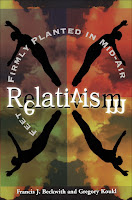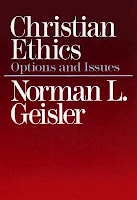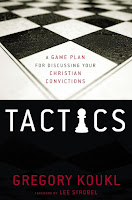The time is coming soon for a new chapter of our children's lives to begin: college life. This can be quite an apprehensive time for both Christian parents and the teens. The parents are preparing to let their kids go out into the world, unable to be protected by Mom and Dad from the various dangers that they experienced too at that age. The students are preparing to get a better taste of independence, learn more about the world and prepare for their future career and lives as individuals. Through exposure to new experiences and new ideas, they will be challenged mentally and intellectually.
Unfortunately, during the years at the university, many Christians become less convinced of the truth of the Christian worldview and many give it up entirely. This is a scary thought for Christian parents, as they know their kids may not be prepared to properly think through the philosophical challenges that this new world will put before them. That is why I have put together a short list of books that parents can go through with their college-bound kids as they prepare to enter this exciting new world. Whether you have been actively preparing your teens for these challenges or have not been so focused on them, I believe these books will prove to be vital resources to read before attending college and throughout the college years. Click the titles to see my full chapter-by-chapter review of the books. They are:
- Tactics: A Gameplan for Sharing Your Christian Convictions- Greg Koukl
- Welcome to College: A Christ-Follower's Guide for the Journey- Jonathan Morrow
- Cold-Case Christianity: A Homicide Detective Investigates the Claims of the Gospels: J. Warner Wallace
- Legislating Morality: Is It Wise, Is It Legal, Is It Possible- Frank Turek and Norman Geisler
- Before You Hit Send: Preventing Headache and Heartache- Emerson Eggerichs
Why Did I Choose These Books?
1. Tactics: A Gameplan For Sharing Your Christian Convictions
My first recommendation is "Tactics: A Gameplan For Sharing Your Christian Convictions" by Greg Koukl of Stand to Reason. I begin with this book because it is an easy read and will help ease apprehension in the reader about how to discuss what they believe. Skeptical questions from friends and others they respect will be common in college and can be intimidating, especially when they do not know the answers right off the top of their heads. The advice offered by Koukl in this book will allow the student to carry on a conversation about their beliefs without necessarily being "in the hot seat." This is the best place to start as it will prepare the student for any "awkward encounters" no matter their level of knowledge. Koukl offers wise advice throughout the book for the apprehensive student (and the over-zealous one), so it is2. Welcome To College: A Christ-Follower's Guide for the Journey
This second book is by Jonathan Morrow and specifically targets the college student. Morrow not only discusses the intellectual challenges to the Christian worldview that will be faced in the university but he also covers that normal day-to-day challenges of campus life. The book certainly will not remove all surprises from the campus experience, but it will definitely reduce them and help the student to maintain focus. This is a great book for the student to keep on their bookshelf and reference from time to time or even revisit between semesters throughout their college career.3. Cold-Case Christianity
The third book focuses on one of the major challenges that the Christian will face from both professors and fellow students: the Resurrection of Jesus Christ. Because of the fact that the entire worldview of Christianity rests on this single historical event (1 Cor 15:14), understanding the evidence for its happening in history will be necessary for any student who wishes to show evidence of the truth of Christianity in a college setting. "Cold-Case Christianity" was written by cold-case homicide detective J. Warner Wallace. He uses his years of experience working murder cases where no existing eye-witnesses are still alive ("cold" cases) to investigate the death and resurrection of Jesus- the most important claimed event that also has no living eye-witnesses. He takes the reader through the process of investigating cold cases and shows how the same methods can be applied to investigating the Resurrection. If you really enjoy this book, you may also want to check out Wallace's book that uses the same methods to investigate the case for God's existence: "God's Crime Scene."4. Legislating Morality: Is It Wise, Is It Legal, Is It Possible
Fourth, Christian politics will be constantly challenged not only in the classroom but also in the student's life apart from the classroom. Because politics are dependent upon ethics and morality, these are also under constant attack. Drs. Frank Turek and Norman Geisler wrote the book "Legislating Morality: Is It Wise, Is It Legal, Is It Possible" specifically to address many of the common challenges Christians face regarding politics. Turek and Geisler demonstrate how anyone who claims to be against the legislation of morality is actually guilty of doing just that. They also demonstrate how the protection of human life via laws can only be grounded in the Judeo-Christian doctrine of the Image of God. Even if college students can avoid discussing politics with their friends, they will be challenged by professors, and they need to know how these challenges are resolved within the Christian worldview.5. Before You Hit Send: Preventing Headache and Heartache
Finally, the book that I want to be freshest in the memory of the college-bound student is Emerson Eggerich's "Before You Hit Send: Preventing Headache and Heartache." While the other books help the student to analyze, internalize, and begin to articulate the case for the truth of the Christian worldview, this book focuses on the presentation: the communication. Eggerichs describes eighty different ways that communication can go wrong and presents four questions to always ask before speaking or pressing "send" on the internet. for ensuring that what the student communicates is effective: Is it true? Is it kind? Is it necessary? Is it clear? It is important that the college student use discernment when speaking to friends or in class or communicating on the internet. Ensuring truthful, kind, necessary, and clear communication with friends and professors will help maintain friendships and establish trust with those around them. This book will not only be helpful in communicating the case for Christianity, but it will help in all other interactions. This is another book that the college student will want to keep on their shelf and revisit often.Bonus: A Secret Weapon
And, I want to add one bonus title to the list for the student who wants an extra "secret weapon" in his or her arsenal. Learning how to think logically provides anyone who wishes to discover and defend the truth an incredible advantage over those who do not take the time and effort. The bonus book is not the most entertaining to read and is definitely the dryest in this list, but it does provide this most valuable tool. "Come, Let Us Reason" by Norman Geisler takes the reader through both deductive and inductive logic. He explains how arguments are formed using each method and what level of certainty (necessarily true or probably true) each provides. This will help the student to properly form their arguments when speaking to others and to be careful not to overstate the certainty level of their conclusions. It will also help the student identify when professors and fellow students make fallacious arguments and/or claim a greater level of certainty about their conclusions than is warranted by the argument they are presenting.Conclusion
While there are many books that would be helpful for the college-bound to read to prepare for their journey, as I've read each of these, I wished that I had had them available to me during that those crucial years. If you want more great books on other topics that will benefit the college-bound, please check out the other Top 5 Books lists. I also recommend that the student join their college's chapter of Ratio Christi (if available on your campus) to have a place where they can go to discuss the many other challenges that they will encounter. Other apologetics ministries that have local chapters that the Christian student can find encouragement and support from are Reasons to Believe and Reasonable Faith. And, of course, the Christian student MUST remain in the Word of God and in prayer throughout their years in college. The challenges that they face will be powerful, and they will not only be intellectual. The student must not only know that Christianity is true but trust and dedicate his or her life to following Jesus Christ. It is as much a heart issue as it is a head issue, and it is only in Christ that the student can find (and show to others) that both the head and the heart can be fulfilled.Follow Faithful Thinkers On Social Media
I have written other posts that the college-bound may find useful as various challenges arise. Please check them out and save them for when that time comes:
- 12 Things Your Professors Won't Tell You About God and Science
- Book Review: The Creator Revealed
- Can Religion Be Tested For Truth?
- Can You Have Purpose Without God?
- Alfie Evans, Humanism, and Christ
- John N. Oswalt: Progress Requires God: A Challenge to Modern "Progressives"
- Apple CEO Tim Cook on Purpose and Ethics in Technology
- The Cognitive Dissonance of Evil
- The Multiverse Instead of God: Four Philosophical Problems
- Is Theism Well-Defined Enough To Be Scientifically Testable?

















